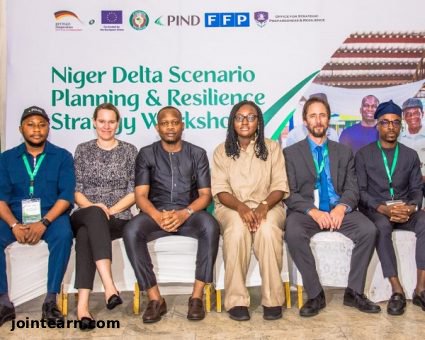
The Foundation for Partnership Initiatives in the Niger Delta (PIND), in collaboration with international and local partners, has launched a data-driven crisis preparedness framework leveraging artificial intelligence (AI) to anticipate, prevent, and respond to conflicts and environmental shocks in the oil-rich region.
Event:
- Occasion: Niger Delta Scenario Planning Workshop on Resilience
- Location: Port Harcourt, Rivers State
- Duration: Three days
- Theme: “From Risk to Resilience: Building a Future-Ready Niger Delta”
- Participants: Over 100 stakeholders from public and private sectors, academia, civil society, and media
Key Partners:
- JICA: Japan International Cooperation Agency
- GIZ: Deutsche Gesellschaft für Internationale Zusammenarbeit GmbH
- OSPRE: Office for Strategic Preparedness and Resilience
- FFP: The Fund for Peace
- EPSG: ECOWAS Peace, Security and Governance Project (EU & BMZ co-financed)
AI Tools Introduced:
- Fragile States Index (FSI)
- State Resilience Index (SRI)
- Crisis Sensitivity Simulator (CSS)
- Purpose: Forecast risks, strengthen institutional response, and improve governance
Objectives & Impact:
- Shift from reactive crisis management to anticipatory governance
- Build resilience across communities, institutions, and sectors
- Position Niger Delta as a testbed for data-driven peacebuilding in West Africa
- Produce a Niger Delta Resilience Strategy, Scenario Planning Report, and a replicable methodology for integration into state-level emergency management systems
Key Statements:
- Dr. David Udofia (PIND):
- “The Niger Delta’s future depends on our ability to anticipate challenges rather than merely react to them.”
- Emphasized the role of data, foresight, and partnerships in transforming risk into opportunity.
- Nate Haken (FFP):
- Highlighted integration of technology with governance for stronger regional peace architecture.
- Stressed that collaboration among government, academia, and civil society is key to sustainable peace.
Participant Involvement:
- Agencies included NEMA, SEMA, NiMet, HYPREP, Nigeria Police Force, NSCDC, and state ministries of environment and agriculture
- Engaged in AI-assisted scenario building and “red teaming” exercises to identify policy gaps and co-create adaptive resilience strategies
Significance:
- Strengthens early warning systems and links them with proactive responses
- Encourages innovative, technology-driven approaches to security, climate risks, and socio-economic stability


Leave a Reply